What it’s like to audition at Juilliard. When you’re 11.

The first round of auditions for Juilliard’s pre-college program is by video. From December to March my son practiced for three hours a day to prepare. At the end of March we recorded him playing Cello Concerto No. 1 in A minor, Op. 33, by Saint-Saëns, and we sent it off to Juilliard.
The results of the first round came quickly. He made the cut.
The art of practicing is finding a process for repetition without boredom.
Then he practiced three hours a day for two more months. The piece he played is about four minutes long. So it’s probably difficult for you to imagine how he spent three hours a day for six months working on that one piece. But practicing—for anything—is a science.
When he told his teacher he was bored, she told him boredom in practice comes from a lack of engagement. She showed him how to recognize disengagement. Then she taught him to look more closely at each note and listen more deeply with his ears and his heart.
He learned to practice by changing the rhythm of the piece. He learned to play one note at a time with a tuner. He learned to play each measure with a different metronome timing, and then he played the piece so slowly it took 20 minutes instead of just four.
During these insane lessons my son spent one hour on five notes; the more we worked on the art of practicing the more I saw that practice is a method to do anything ambitious and difficult. Through hard work, he learned to create a system and process instead of just focusing on the goal itself.
The best processes speed up the cycle of frustration and recovery.
The first 3,000 hours of cello lessons are learning how to recognize a wrong note and stop and fix it. And now he has to learn how to recover from failure, very quickly, so when he plays a wrong note in competition he can move on immediately. Even though I don’t know if he’s sharp or flat, I do know that if he’s sulking about making a mistake—he can’t focus on not making the mistake.
Resilience is about being able to get back up on your feet on your own, so I teach him not to rely on other people to prop him up. “You don’t need a teacher to tell you how great you are. Tell that to yourself. Right now.”
It’s a hard concept. On different days I tell it to him differently. And then I watch hopefully, because I tell that to people I coach all the time and I know it’s hard, even for adults.
Last Thursday was the big day.
My son is on a mission.
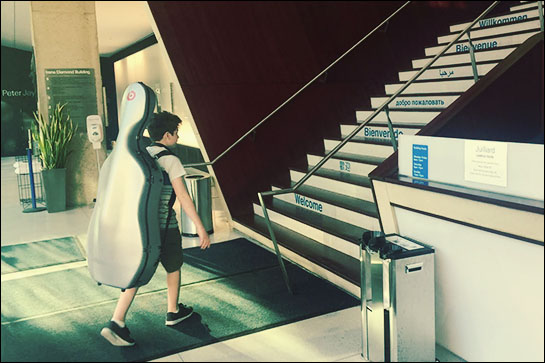
I am on a mission, too. I want to hug him and high-five him and tell him he blows me away with his hard work. But I don’t want to embarrass him, so I take pictures instead.
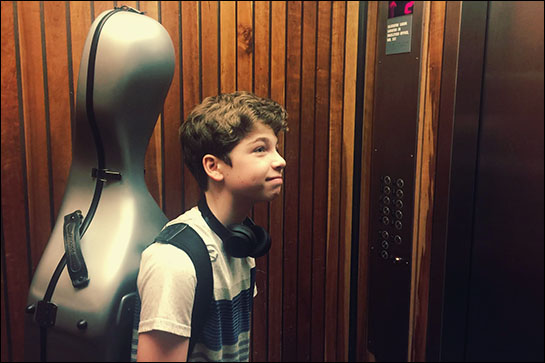
Until he says, “Mom, put your phone down! You’re embarrassing me.”
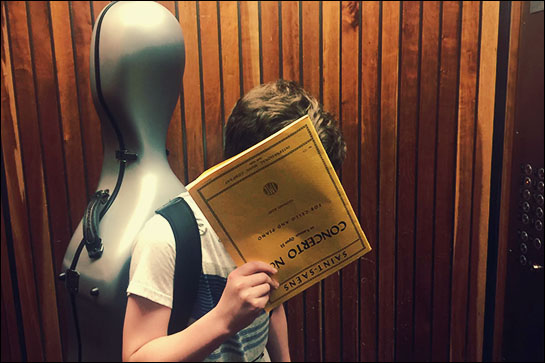
Breaking things down into small steps isn’t enough. Make them smaller.
It’s impossible to put all your energy into something really difficult if everything is riding on the result. The people who are the best at reaching big goals have an obsessive drive toward the goal, but also, they are able to break down the process of meeting the goal into tiny, bite-sized pieces and then take pleasure in completing each part.
When someone is unable to relish the small steps, they just stop. Because process starts to seem hopeless if you constantly focus on the end. You have to have a proclivity for hard work (which might be as crucial and inheritable as talent) combined with the ability to take joy in the process itself.
He practices facing the accompanist so they can see how each will play particular parts.
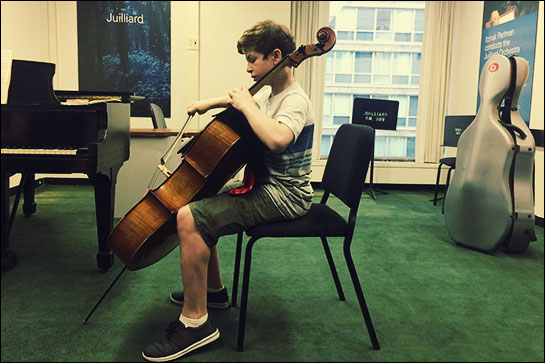
Then he turns his back to her because that’s how it’ll be at the audition. She watches his arm and his head for cues. They don’t have to talk. They both just know that this is what will happen.
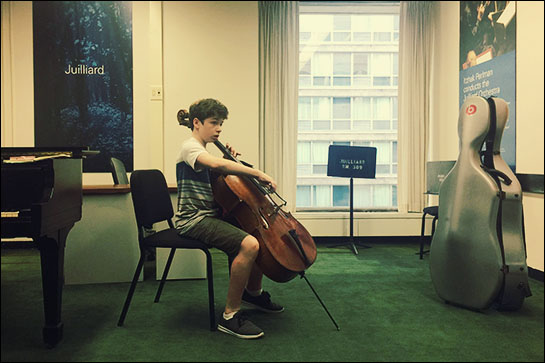
He has been eating carefully and sleeping carefully for a week. He reminds me of how I used to work to peak for the beach volleyball season and recover over the winter. And he reminds me of everyone who has ever worked hard for something that is a long shot: He is nervous.
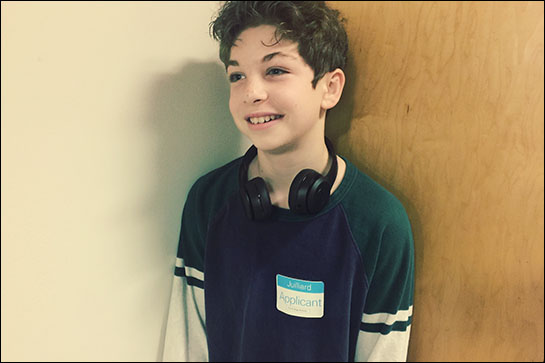
No process works without a coach who deeply understands the goal.
The teacher has been training him for nerves as well. We scheduled five competitions prior to this audition so he would get used to playing this concerto under pressure. People perform better—in any circumstance—with a little bit of stress. Top performers self-regulate to generate the optimal amount of stress.
The teacher had him run up and down our street to get his heart rate up and then had him sit down to play his piece while his pulse was still racing. And the other day when he came home from a basketball game he wiped his hands all over his face and played his piece with sweaty palms.
Now he gets dressed and he waits. I can’t read music and I can’t tell what’s in tune, but I do know what it’s like to have focus, so we have practiced waiting. In this outfit. I made him stand by our front door, where there is nothing to look at. And I didn’t tell him how long he’d be waiting. And he practiced controlling his thoughts and his nerves.
Finally, here we are, and he looks so grown up to me.
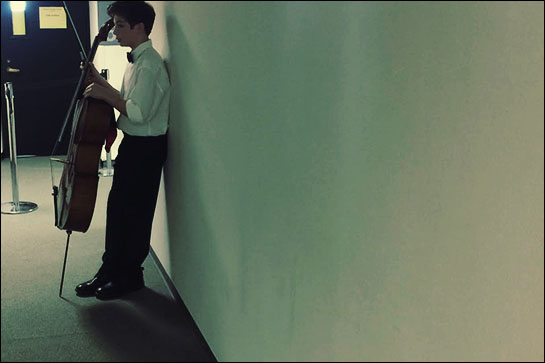
The door opens. He goes into the room, and he plays.
I wait. The kids in the other practice rooms are too loud for me to hear him. So I just think good thoughts.
And it’s over.
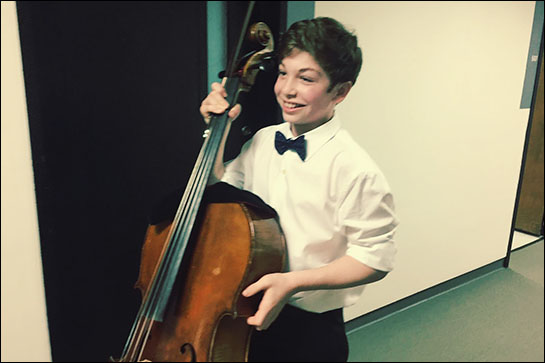
We won’t know the results for another two weeks. But we already know that he worked incredibly hard and he grew from each step of preparation.
So he already won. Because now that he’s done this for cello, he can do it for any part of his life in the future.
Update: He got in!

I am thinking good thoughts as well.
So am I. :)
So am I. :)
Love the photos,such a handsome boy!
Look at his face after! That is success!
I am really happy for you two. What a journey.
Of all of the posts of yours that I’ve read, this is my favorite. Thank you.
Yes! Mine, too!this is phenomenal.
Your son looks just like you. What a remarkable young man.
Wow! What a great post. One of your best, and I’ve been reading your blog for a long time. Loved all the words of wisdom here. I agree that whether your son gets in or not, he has gained much from the experience. And, he’s fortunate to have you for a mom to help guide the way.
My FAVORITE article of yours.. by far (and I love most of your articles) can’t wait to find out how he did. The coach sounds excellent.
This is beautiful. He is beautiful.
I hope this makes you feel like a successful Mom! It makes me proud of you too for all of the hard work you do for your kids.
Well done getting him there Penelope.👏👏👏
All the best with the results 💋💋💋
This is what it’s like to audition at Juilliard at 11, and it’s also what being engaged in life looks like.
I’m rooting for you and your son!
Fantastic! Great to hear the creativity you both used in prepping, and, no doubt, it’s going to be good news.
Really great post, Penelope!
What a great kid.
Great post. He’s beautiful, and you’re right; he’s already won with the self-control he’s learned. Good luck!
My kids all play musical instruments and have since they were all 4. It’s tedious making time to practice with each kid every single day. It’s expensive. It’s a lot of failure followed by a little success; however, your last sentence captures exactly why I have them do it – it is all about the discipline, the process, and the WORK.
I loved this. What a beautiful story. He should be proud of himself, and you should be proud for being such an encouraging and supportive mother. This makes my heart happy.
Great post. Your advice and observations are spot-on.
Beautiful post. Sending good vibes your way.
Congratulations! To both your son and to his amazing mother. His smile at the end tells everyone that this journey has been worth it. There is no feeling like the sense of accomplishment where you dream big and put everything towards it. That feeling makes all the hard work worth the practice.
Also, I hope he gets in. The goal is important, too.
This gave me shivers. You’ve given him an experience that will shape his life forever, either way.
It was also exactly what I needed to hear today!
Will wait in anticipation of good news. Wont say good luck … he has absolutely earned this.
Well this was a great read, with great advice. Thanks for sharing.
Penelope,
Congratulations to both of you! You’ve given a gift to us all… a classic story of what success looks like written with great love and wisdom.( the photos are beautifully revealing too)
Penny,
This was one of your best, and I’ve read alot over the years. The poignancy of this event in your lives at this moment, along with the fact that my 16 yr old son is prepping for nationals in an event in July, show me how far we have to go. Thank you.
Incidentally, your son resembles you alot. In my culture that means that he will be fortunate in life. I wish you the best.
D
This is fantastic!
He has matured SO much since September. It is crazy!
I love that you had him wait by the door. I’ll bet that is a strategy that is often overlooked by people, but could make or break an audition.
Best of luck!!
This was my favorite post in a long time.
It’s well written, useful, inspiring and heartfelt.
Oh, and your son is so handsome! :-)
You two form a beautiful partnership.
Agree with previous posters what a handsome young boy. He looks like you as well.
I hope he gets in. I played the violin for 8 years so I know learning how to play a musical instrument isn’t easy. So the fact he’s made it this far is a wonderful achievement,for you as a mother and for him as a cellist.
I’ve been reading your blog for a few years and have never commented, although most of your posts are thought-provoking and many have inspired me. I’m commenting today to say this is my favorite post of yours, ever. It’s inspiring, happy, informative, straight-forward, thought-provoking, and creates a feeling of hope within me. Nice job.
Congrats Penelope! It’s amazing – with some of the struggles you’ve been going through lately, it’s wonderful to see what it’s all for. He looks so happy.
Good luck for sure, but realize that every parent thinks their child is a star. You might want to make sure that these are his desires and not you living vicariously
That’s the thing I dislike about the world of classical music: at times it can seem to be all about competition: ars not gratia artis but for the sake of competitiveness. You suspect at least some of the protagonists hardly care about the music. I realize this is no modern-day tiger mom phenomenon, i.e., that it was always so (viz., e.g., the virtuoso mills of the XVIIIth century), but it’s still disagreeable.
It’s actually about excellence.
Classical music is about accomplishment. Not competition. However, competition is one way to motivate kids towards accomplishment. Some kids may not need competition to motivate them, but others do. THe point of classical music is not to win awards. THe point of classical music is to play the music well. Penelope should write a post about that.
By the way, it makes no sense to say classical music is not about accomplishment. Classical music is very technical and precise. It takes an accomplished player to do it justice.
There’s a way in which what you say here is true, and a way in which it is false. Yes, it is very nice to contemplate music for the joy of music, not for the sake of awards. And also being unaware of the level of competition won’t get you to winning.
One of the salient facts about the world of classical music is that very few people can ever make a living playing classical music for others. The number of professional classical musicians is maybe two orders of magnitude greater than the number of aspirants.
Most of the kids who play strings very well won’t even be helped on their college application by that fact. Colleges are lousy with violinists and cellists.
So there’s something of a supply and demand thing going on – the demand for recognition or employment in classical music far outstrips the supply, and therefore the price goes up, the price, in this case, being competition.
At PT son’s age, the competition is already intense, and if a kid plunges into serious competition at a later age, it’s already too late to shoot for the brass ring. Joshua Bell was up at Meadowmount at age 11. It’s a world of prodigies.
In the case of supporting her son’s cello dreams, PT is doing the right thing. She couldn’t have supported him in this in rural Wisconsin. She had to move to a city with a major conservatory and enroll him in a conservatory prep program so he could learn from his peers and from the best teachers and coaches. And he has to put in the hours required to be his best in auditions.
Well done to both of them and I wish them not luck but recognition for their hard work.
@Bos– Actually, I grew up in rural Wisconsin, had fantastic teachers, and have become a professional violinist in one of the top orchestras in the world, and play chamber and solo repertoire, too.
I can agree that practicing methodically, intelligently, and consistently are absolute prerequisites for success in the classical music world. But what some parents don’t take into account is that children need space to grow into adults that have something meaningful to say, and have a wide range of emotions and experiences to draw on. Technical precision will take you a long way, but if you have nothing to say with it, it’s not going to interest anyone for very long. And only practicing musical phrasing without developing the soul behind it through living life outside the practice room fully is, in my opinion, a waste. Still, if the described practice regime was for a limited time before a set big event, then it’s great, and well done for giving complete support!
Hi Geigegirl. Good for you! It does make me curious, though. Did your parents drive you six hours to Chicago to take lessons, or did you find teachers who were actually local to you? Were your parents or anybody else in your family musicians, or were you an unexpected sport?
To be clear, it’s not that nobody could become a professional classical musician coming up in rural Wisconsin – obviously you did! But one of the general themes here is that parental knowledge and social capital are more important than school education. If kids can’t get this from their parents, they have to get it somewhere else. In the realm of music, PT had no background or resources, and she needs an external institution to provide all of that for her kid – it wasn’t happening on the farm. You found that social support somewhere in rural Wisconsin; PT found it nowhere in rural Wisconsin.
It seemed like PT and her kids were, or at least felt, extraordinarily isolated on that farm, with no available teachers or youth orchestras anywhere. Of course, giving it a little thought, she’s not actually much closer to New York over there in Swarthmore than she was to Chicago over there in Darlington. She’ll still be doing a six hour round trip. But at least in a few years the kid can take the train in by himself.
Obviously, your advice and perspective on this is much more valuable than mine. I can share my observations from having a few professional musicians in my family and from seeing so many kids and families at our conservatory on the weekends, but I’m not a musician. One of the things I definitely notice is how young kids start to distinguish themselves and how many children of musicians take the same road as their parents. So I tend to think there’s something to that social capital idea.
I know my son would like your advice to live his life instead of practicing too much. My boy certainly doesn’t ever put in three hours a day. But neither did Joshua Bell: “I know some kids or people practiced 8 hours a day. I would die if I did that! I mean I physically wouldn’t be able to do that. I don’t think I could survive that but I learned to make the most of my time and be efficient. So I would practice 1 or 2 hours a day… “
GeigGirl
Great point about technical precision vs what I’ll call musicality, that is the ability to play from the heart. My son is a composition student (and also plays violin) at Juilliard’s pre college program — and there are a surprising number of students who can’t read music well. But they can play the crap out pieces they’ve studied for months — often at the expense of learning other pieces! Not saying this is Penelope’s son’s situation. Just speaking from experience.
Hi Bos,
I’ve had contact with Josh Bell on and off for years, and I can say that he definitely knows how to fill his life with content and experience of all kinds, and is an expert at channeling that into music. He’s also just a mega-talent, and there aren’t many people who could do what he does on that amount of practice. Not to mention the amount of sleep he gets!
On the subject of Wisconsin, I lived in the middle of the woods, but my dad taught at a local university. I grew up blessed by contact to a fantastic violin teacher and all her pupils. I know that’s the exception to the rule, but I just wanted to point out that finding a nurturing environment for kids to grow up in doesn’t necessarily mean moving to an urban or suburban area.
I’ve been reading your blog for close to 10 years, I guess, and this is hands down your best post ever. I learned so much about what I need to do to succeed in my next project and why I’ve failed in the past. I wish your son the best, and you’re an amazing mom! (Maybe you remember me telling you years ago not to yell at your kids and you said it resonated with you. :) )
This helps immensely.
Wishing him the best of luck.
That post flies true. Straight to the heart.
I’m sending your son the finest magical luck for the results.
Stating the obvious, the rest is up to the subjective luck of the judge’s. As you say – he is already a winner. His job was to do his best and show up. It sounds like he exceeded that by a mile.
I hope you take your own excellent advice sometimes:[ “…You don’t need a teacher to tell you how great you are. Tell that to yourself. Right now.”]
I try to take your excellent advice also. I am getting better at it – must be the practice :)
Thanks so much – your writing inspires me.
From the land of tiny hobbits, gold mountains, and large dragons,
Rebecca
Well done.
Wishing the best of luck to him! What a lot of hard work and focus he put into this audition! Great job!!
This made me so happy. You are a good mom Penelope.
This is one of your best posts in a long time, Penelope – and I’m not a person who reads complaining that I don’t like your posts, I really enjoy your writing.
You’re so honest about the ways you think you are a crappy parent (multiple) and then a post like this where you’re still telling us everything you can’t do repeatedly (know if he’s out of tune, read the music – whatever – that’s what his teachers are for!) shows all the great things you do as a parent.
He looks soooooo happy, I hope this is how your other son feels when he’s studying :)
I was even a bit annoyed at the beginning of the post when you said we don’t understand what it’s like to play a four minute piece for three hours for months. I was like uh yeah, I do get rehearsal – anyone who does dance or has also played an instrument or gets really into sports does get it. But I forgot my annoyance because I loved your creativity in practising. Practising waiting! Practising after running around, practising with sweaty hands. I love it.
I don’t want to take away from his efforts in this because I firmly believe that your average kid makes their own choices about wanting to do well at school or sport or whatever they’re interested in. I developed this theory when I was not much older than Z… about age 13… in a large school with lots of kids from low socio economic background. But I do also believe in the springboard of parental support and this is a great example of both in action. :) Congratulations on doing so well so far, learning so much and fingers crossed for the result you guys want!
I take issue with your point that anyone who has done sports or dance understands what it’s like to practice a four minute piece for months and, as a former dancer and musician, I respectfully suggest that no, actually, we don’t.
The vast majority of Penelope’s readers won’t know what it feels like to practice a four minute piece to the level of intensity that a Julliard-calibre cellist will – the closest analogy I can come up with is the tennis player who practices his serve *with no ball* for three hours, every day, for months using just the feel of the serve as his feedback.
I once watched a Julliard-bound cellist practice a single note (on an open string, no less) for 45 minutes with such intensity that he was sweating when he finished….and I swear that every single one of those notes was unique.
As a former dancer and piano student, I have to disagree with your assertion that we wouldn’t understand. We do understand the obsession with growth and improvement and have engaged in countless hours of incessant practice, and then experiencing the condescending looks of people pitying the futility of it all because the assumption is always that you’ll never make it, you’ll never survive and make a living, and you’ll never succeed, even after all that practice.
I still experience that feeling today with writing, as all writers do.
It’s a mindset. It isn’t the activity driving the person. It’s the person driving the activity.
With respect, it’s not about growth and improvement. At Julliard level, it’s about an obsession with perfection – you are perfecting the physical output of your interpretation. And because perfection is unattainable, the task never stops.
The reason Julliard wants you to play the same piece at both auditions, months apart? Because they want to see (at the first audition) that you can play brilliantly and (at the second audition) that even once you can play it brilliantly, you will keep pushing and making meaningful changes. Playing the same piece the same way will not get you through the second audition. Millions of people can master a piece and play it well repeatedly; it takes an exceptionally rare talent to master a piece in many different ways and then keep looking for new ways to master it.
I agree with you that it is a mindset; where I disagree is the question of how widespread that mindset is. In my experience, the number of people who have experienced (or observed) that mindset is very small.
Also, you sound a little bitter….it has been my experience that the people to whom this mindset of persistent pursuit of perfection comes most easily are the people for whom succeeding is irrelevant. What matters most to them is the pursuit of perfection and they tend to be rather pleasantly (and embarrassedly) surprised when they discover that they can make a living at it.
I won’t continue debating you.
I will say that bitter people perceive bitterness in most everything they read or consume.
Interpret that any way you desire.
LOVE!!!
My favorite article for a number of reasons. Such great insight!
It’ll be a long 2 weeks.
This is so exciting. And then distracting yourselves while waiting and he’ll continue to practice regardless. That’s the hardest part, continuing to practice regardless. That’s the part that needs outside support and that’s what you’re so great at. This was inspiring.
Great post!
Uau! I love this post! Good luck!
I was a serious musician through college, and I wish my parents had had me do some of these things. I was always a horrible performer, and didn’t understand that performing is completely different than practicing, and needs its own kind of practice.
I am making my daughter play the cello, and it’s a struggle. She has little interest, but is continuing to progress in spite of herself. I will not let her quit because I believe the aspects of practicing that you mentioned as addressing a skill set that does not come naturally to her – e.g., perseverance to overcome frustration and the repetition of nitpicky details.
OMG, this posting gave me chills. Good luck to him!!
Thank you for sharing this journey with your son. It’s amazing and inspirational. And I think the same will hold true with your other son. I’ve read and remember the discussions of nature/nurture on your education blog. Nature is given to us and nurture is what a parent and others are able to do with it. You’ve done a very good job nurturing your sons. They are already fine young men. This blog post is one of your best for a number of reasons. I really like how the text and photos flow together to tell a great story that I can also learn from in the process. What really stands out to me is the identification and amount of mental preparation necessary beyond the actual practice of the musical instrument. So yes, I agree he has already won. I also know he’s still preparing and practicing because that’s his nature.
This is a truly great post- the sequence of writing and photos worked so well. Normally I find your photos quite secondary to your writing (which stands on its own), but in this post they are integrated in such a lovely way. Props on a great post and on being a patient, attentive parent. xo
Aw I loved this post and all the pics you took! What a handsome son you have Penelope! And what a hard working mama you are to help him get this far!
x
Maria
This is a wonderful post, and so right on about practice and reaching long term complicated goals.
His smile at the end brings tears to my eyes.
Could you put a video of him playing this piece on YT so we can all enjoy the fruits of his hard work?
Even if he never makes more than pizza money playing, at least he’s pursuing a difficult goal with all he’s got. Most people have no idea what that’s like.
This is one of your best posts ever, Penelope, on so many levels — professionally and as a parent! Thank you for sharing your son’s impressive accomplishment and his discipline along the way. I will be sharing this story w/ my kids, 12 and 9. I have tried and TRIED to explain the importance of practice in their individual sports (my son, baseball and my daughter, figure skating). Thank God for their fantastic coaches who “break things down” from a skill perspective, but it’s the “practicing on their own”/boredom part that’s hard. Please tell your talented son what an inspiration he is!
My friend solved this in her own home by saying if her children want to play sport or do piano, that they have to practice for 15 minutes a day on a timer, otherwise she stops paying and they stop playing. She will not force them to engage beyond that, and would stop paying if they didn’t hold up their end respectfully and without nagging. It’s as simple as they have to work at it, and work for it, and find joy in it- no one else can do that for them.
She found that after the first 3 times with the timer, their focus and ambition improved to where they would continue practicing for an hour past required time. There is no longer a timer, and they are exceptional because it is their choice to continue and they don’t want to stop.
I believe this happened somewhat with Penelope, where she told her kids they could just stop and they chose to continue. She does say she nags them about practice- but based on the post above it looks like her son has found his own rhythm.
I’m not too familiar with cultivating external motivation. My son is a figure skater, which I’ve always been the follower in and funding source, not a leader around the sport or practices in any way or direction for him. We just show up together (it may help we previously lived with an ice rink on our literal doorstep below our apartment) and something he finds a lot of joy in outside of lessons. I find him learning by teaching on the rink- he will take what he knows and find a struggling non skater and teach them.
If it came to him not engaging and not holding up his own interest we would have the discussion of possibly ceasing the sport or taking an extended time away from it. That hasn’t happened, yet.